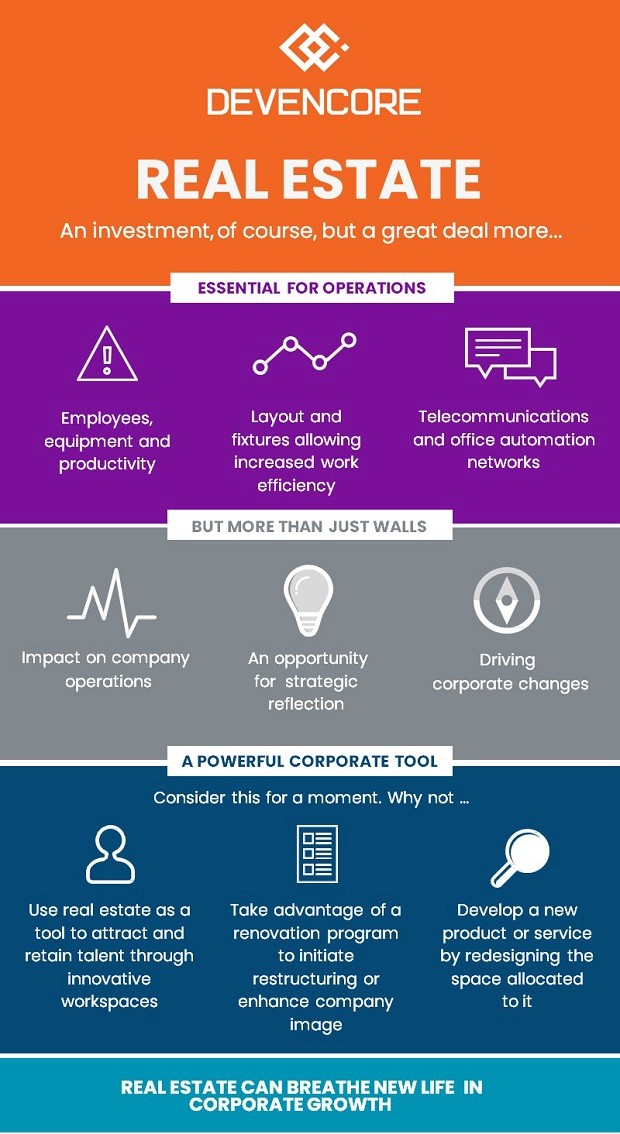* – This article has been archived and is no longer updated by our editorial team –
Below is our recent interview with Rob Renaud, Senior Vice President at Devencore:
Q: Could you provide our readers with a brief introduction to Devencore?
A: Devencore is a top-tier privately-owned Canadian commercial real estate brokerage and advisory company. With over 45 years of expertise, offices across the country and global reach, we specialize in representing corporate space users and also offer full service solutions to clients, investors and landlords. Our strength lies in our ability to understand our clients’ objectives, react quickly to their needs, all the while providing high quality, creative and effective solutions that address any particular situation. Devencore works with clients from a variety of industries including tech, media, legal, engineering, advanced manufacturing, education and many others.
Q: The topic of open plan office space has been greatly debated on both sides. What trends do you see in the market place in terms of preference?
A: In the 1970s and 1980s space was designed like what you see on Mad Men and Dilbert (big offices and high-walled cubicles with little natural light) and a lot of corporate campuses were owned. In an effort to reduce costs and increase shareholder value, many companies sold off their buildings and cut space per employee from 250-300 square feet to 100-150 square feet by going to open plan. Some have gone as far as setting up bench-style seating with no private workspace. They justified the change by pushing offices towards the interior of the floor to give open plan employees access to natural light and creating some break-out rooms with the belief that employees would collaborate more and feel more engaged. Many companies have taken away dedicated space for each employee completely; with hoteling and work-from home plans. The reality as we tell our clients is that not everyone does the same kind of work and break-out rooms aren’t enough to provide the private workspace needed for quiet thinking and productivity. So, not surprisingly, recent studies completed by behavioral scientists and workplace psychologists confirm that office space is not a one-size fits all and should be designed to suit the activity of each worker (i.e., “activity-based workplace design”). This is no easy task but it’s a positive step in the right direction.
 Recommended: SpokeHub Brings The Social Back To Social Media – Raises $2M In New Funding
Recommended: SpokeHub Brings The Social Back To Social Media – Raises $2M In New Funding
Q: Canada is globally known to have a hot housing market. How does that affect commercial real estate and an international company considering a re-location to Canada?
A: If you asked me this question 10 years ago, I would have told you that the residential and commercial real estate markets are not necessarily in sync other than the impact that interest rate movements and economic shocks might have on the overall marketplace. However, a lot has changed. Canada has historically grown all of its real estate classes in a sprawl fashion, with the cities growing through suburban development. Major Canadian cities are no different from others globally and have seen a shift towards infill redevelopment, densification (more residents and more workers in less space) and a gradual move away from everyone owning a car and driving to work. These trends have been facilitated to a great degree by technology innovations that have allowed for mobile work, freelancing and an appetite by younger generations like the Millennials to simplify their lives by being able to live, work, learn and play in walkable urban settings. This put the brakes on major suburban office building development in the last few years as tens of millions of square feet of modern office space have been built around transit-accessible and condo-centric locales in major Canadian cities. With interest rates still being at all-time lows, this has allowed companies to borrow cheaply to fuel growth (leading to more hiring and more construction) and families to pay more for housing. We are on the crest of a potential bubble in Canada where prices for all real estate asset classes are at an all-time high. Talent is also becoming more scarce which is why flexible immigration policies have ensured that Canada maintains a healthy labor pool. However, it’s now very expensive for an international company to move to places like Toronto and Vancouver where office and industrial vacancy rates are 2-3% and housing for purchase and for rent is scarce and unaffordable for many. Time will tell, but while Canada’s near-term prospects look bright, if we have any major interest rate increases or other economic shocks (for example, NAFTA is being renegotiated right now), Canada could face some big headwinds going forward.
Q: What influences large international tech companies like Google, Amazon, Sony, Microsoft etc. to open offices in large Canadian cities?
A: As I mentioned earlier, there has been a movement towards urbanization. This trend is happening in major cities across Canada and around the world. Our major cities have some incredible attributes that have put us on the radar of many of the world’s fastest-growing companies. For one, the development and urbanization of our downtowns has created a larger stock of available office and residential space and a dynamic environment that has attracted a lot of well-educated knowledge workers who have catalyzed the innovation economy. Canada has some amazing post-secondary education institutions – both universities and colleges – and these have become incubators for both talent and new tech ventures that are now Canada’s unicorns. Some of the investments that have been made are now starting to bear fruit and these larger international tech companies want to take advantage of these structural changes in our economy. They also view Canada as a stable market with safe cities and a government that is forward-thinking. Toronto has been shortlisted for Amazon’s HQ2 and Alphabet/Google’s Sidewalk Labs is establishing a new innovative community on our waterfront, for example. Montreal, for its part, is now being recognized as a hub for Artificial Intelligence within the global community. We have seen thousands of new jobs created and demand is unabated. These are exciting times for Canada on a world scale and we are paying close attention to the next tech office hubs that our clients should consider.
Q: What are some of the most unusual trends you are currently seeing in the tech office market?
A: With our pipeline of ongoing projects with tech companies (both big and small), there are all kinds of things happening. For example, major lease commitments are being made for hundreds of thousands of square feet by high-growth tech companies which are not yet profitable. We are also seeing developers starting to build office towers on a speculative basis (i.e. without any tenants signed up) to meet the significant demand coming from the tech sector. These trends present elements of risk to the office market sector (reminiscent of the dot-com bubble in the year 2000) and it will be interesting to see if demand will maintain the same momentum in the years ahead. We are also seeing small and mid-size tech companies more willing to jump into co-working space as they ramp up, providing a greater degree of flexibility. These are all new things happening in Canada that are unusual for the market.
Q: What are the three most important RE requirement that tech tenants are asking for when looking for office space?
A: Tech companies by their nature continue to have a need for reliable building infrastructure (power, cooling, etc.) to accommodate their cloud-based computing needs. They also have a need for high speed wireless internet access throughout a building to accommodate their workflows amongst various teams. Finally, they prefer creative spaces that have high ceilings, large open floor plates, lots of natural light (big windows) and on-site amenities such as cafes, fitness facilities and entertainment. So, buildings don’t need to just be productive for a tech company’s work but they must also cater to personal needs of their much-coveted employees to keep them energized and motivated. When we work with our clients, we go through a complete needs analysis to identify all of these aspects to ensure their office buildings and space perform on these and multiple other levels.

Q: How do you predict the tech market to transform in Canada in the next 5 years?
A: The next 5 years are going to be interesting for Canada as part of a global network of tech clusters. There continues to be growth within the e-commerce sector and this is transforming all aspects of the real estate market. As we continue to move towards a sharing economy, we believe that lifestyles and needs will evolve accordingly. It is not far-fetched to think that in the near future, we will live in a world where people may not need their own cars (reducing the need for parking spaces, driveways and garages) and where artificial intelligence improves with the proliferation of “big data” to a point where there’s more automation in our lives and where residential and commercial space is more fluid to the ebb and flow of the population. We’re already seeing the impact of e-commerce on malls and retail storefronts which are being substituted for large industrial fulfilment spaces. The same thing holds true for office space – tomorrow’s companies will be focused on how to integrate the internet of things into every aspect of how buildings work and what gives workers comfort and satisfaction. TV shows like the Jetsons and Star Trek may have been ahead of their time. We are tracking all of these trends and their impact on our clients who need real estate advice, and are helping them craft solutions that ensure they are future-proofed.
Activate Social Media:


